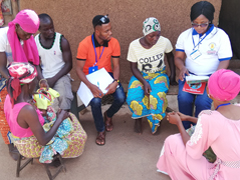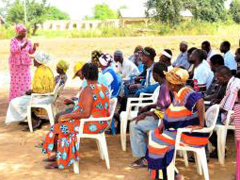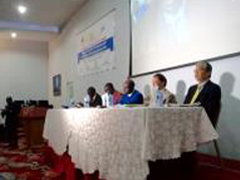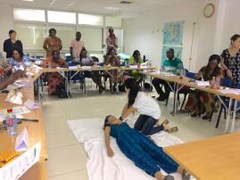August 14, 2019
In 2017, Ghana marked the 60th anniversary of diplomatic relations with Japan and the 90th anniversary of the visit of famous Japanese bacteriologist Hideyo Noguchi to the country. Among countries in Africa, Ghana has a particularly long, deep relationship with Japan. The Japan Overseas Cooperation Volunteers, which in 2017 also marked the 40th anniversary of sending their first volunteers to Ghana, are engaged in grass-roots cooperation throughout the country and greatly contribute to building trust between the two countries.
Ghana, which continues to show favorable economic growth supported by a political stability, has recently transitioned from a low-income country to a middle-income country. A considerable number of Japanese companies are showing interest in Ghana as a base for doing business in West Africa.
JICA is providing its Official Development Assistance in accordance with the policy direction and economic changes taking place in Ghana. In the field of infrastructure, JICA formulated a master plan to create an international logistics corridor, putting Ghana's economic growth on a more solid footing. In the health-care sector, JICA is spreading the results of its more than 10 years of cooperation throughout the country, reducing regional disparities and contributing to improvement of the health system and services.

Working to improve the local health-care system in northern Ghana
Putting stable growth on a more secure footing
Ghana has earned the praise of the international community for driving democracy in West Africa. Given its political stability, Ghana is expected to have stable economic growth in the medium term because of the commercial production of oil that began in 2010. On the other hand, it still faces the problems of disparities between the northern and southern parts of the country and inadequate economic and social infrastructure.
To overcome these challenges and sustain Ghana's social and economic development, JICA is carrying out its assistance to Ghana with an emphasis on the fields of infrastructure development, strengthening the industrial base, health care and enhancing the human-resources base.
These fields conform to the priority assistance areas Japan announced at the Sixth Tokyo International Conference for African Development (TICAD VI) held in 2016 of "Promoting Economic Restructuring Through Economic Diversification and Industrialization," "Resilient Health Systems for Quality of Life" and "Social Stability for Shared Prosperity."

The streets of Accra, the capital
A showcase for promoting universal health coverage
Universal Health Coverage (UHC) is about all people having access to the health care they need without suffering financial hardship. At the sixth Tokyo International Conference on African Development in 2016, Ghana was chosen as one of the prioritized countries for promoting UHC. In 1999, the government of Ghana established a national strategy for promoting Community-based Health Planning and Services called "CHPS," and it has been working to achieve UHC ever since.
JICA has been providing cooperation to promote CHPS for more than 10 years in the northern part of Ghana, where there are insufficient health care services for maternal and child health (MCH) in particular. As a result, the MCH situation has improved greatly in the Upper West Region where JICA has been providing cooperation. Through the Project for Strengthening CHPS focusing on the Life-Course-Approach in the Upper West, Upper East, and Northern Regions, JICA is now working to build a model that ensures more effective health care services and contributes to improvement of accessibility of quality community healthcare.
Moreover, through the Project for Improving Continuum of Care for Mothers and Children, JICA is introducing the Combined MCH Record Book in all regions. The effective use of the MCH Record Book is intended to assist the health care workers to provide better MCH services and to improve accessibility to continuous high-quality health care services for mothers and children.

Community health volunteer training as the key to community health care services
'Regional economic integration' as the key phrase of economic growth
"The Project on the Corridor Development for West Africa Growth Ring (WAGRIC) Master Plan" is a corridor development plan that links Ghana, Côte d'Ivoire, Togo and Burkina Faso. These four countries are located in the West African sub-region, and they are relatively small in terms of economy and/or population. The Master Plan, which also looks at possible opportunities with a large country like Nigeria, was proposed at TICAD V in 2013. Japanese companies have great interest in this regional corridor, and the West Africa Growth Ring Corridor was selected as a "focused region for unified wide-area development" at TICAD VI in 2016.
The WAGRIC Master Plan defines the West Africa Growth Ring with three international corridors that connect the four countries, along with the Abidjan-Lagos Highway. It identifies development potential as well as transportation bottlenecks in the target area, and aims to achieve balanced economic development and enhance connectivity between coastal and inland areas. With JICA's assistance, the master plan was officially launched in 2018, and a joint monitoring structure for the four countries has been established. Fundraising activities have been carried out since 2018, and high priority projects are expected to be rolled out soon.

A seminar to announce the completion of the master plan
Leveraging learning in Japan
There are school health education program (SHEP) coordinators in district educational offices throughout Ghana working to promote community school health. About 20 of these coordinators have undergone JICA training in Japan on School Health. Since returning to Ghana and to their communities however, they found difficulty securing funding or cooperation from the people around them for their activities.
Since the beginning in 2018, the Ghana Ministry of Education and Ghana Education Service have begun sponsoring workshops as an opportunity for coordinators to give back to Ghana by sharing what they had learned in Japan. The Japan Overseas Cooperation Volunteers (JOCVs) working in school health have also participated in these workshops. It has been an experiment intended to deepen ties among coordinators and JOCVs, to build a structure for cooperation and to promote school health.
At the workshops, coordinators gave presentations on their activities since returning to Ghana, while JOCVs demonstrated mock classes using educational materials they had made themselves. Coordinators and JOCVs then teamed up to engage in activities to promote school health.

JOCVs working in school health demonstrate first aid.




scroll